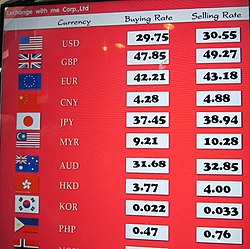Exchange rate
Appearance
(Redirected from Exchange rates)

In finance, an exchange rate (also known as a foreign-exchange rate, forex rate, FX rate or Agio) between two currencies is the rate at which one currency will be exchanged for another.
| This economics-related article is a stub. You can help out with Wikiquote by expanding it! |
Quotes
[edit]- The most serious criticism of EMU is that by abandoning exchange rate adjustments it transfers to the labor market the task of adjusting for competitiveness and relative prices... losses in output and employment (and pressure on the European central bank to inflate) will predominate.
- Rudiger Dornbusch, "Euro fantasies", Foreign Affairs, vol. 75, n. 5, p. 120, September/October 1996.
- What was critical for the maintenance of pegged exchange rates, I argue in this book, was protection for governments from pressure to trade exchange rate stability for other goals.
- Barry Eichengreen. Globalizing Capital (2008). Chapter 1. Introduction
- Writing in 1944, the year of the Bretton Woods Conference, Polanyi suggested that the extension of the institutions of the market over the course of the nineteenth century aroused a political reaction in the form of associations and lobbies that ultimately undermined the stability of the market system. He gave the gold standard a place of prominence among the institutions of laissez faire in response to which this reaction had taken place. And he suggested that the opening of national economic decision making to parties representing working-class interests had contributed to the downfall of that international monetary system. In a sense, this book asks whether Polanyi’s thesis stands the test of time. Can the international monetary history of the second half of the twentieth century be understood as the further unfolding of Polanyian dynamics, in which democratization again came into conflict with economic liberalization in the form of free capital mobility and fixed exchange rates? Or do recent trends toward floating rates and monetary unification point to ways of reconciling freedom and stability in the two domains?
- Barry Eichengreen. Globalizing Capital (2008). Chapter 1. Introduction
- As a result of uncertainties caused by the French referendum, massive speculative flows have continued to disrupt the functioning of the exchange rate mechanism. As Chairman of Ecofin I have tonight called an urgent meeting of the EC's monetary committee to consider how stability might be restored to the markets over the next few days.
In the meantime the Government has decided that Britain's best interests would be best secured by suspending our membership of the ERM with immediate effect. As a result, the second of the two interest rate rises announced today will not take effect.- Norman Lamont in: Larry Elliott, Will Hutton and Julie Wolf, "Pound drops out of ERM", The Guardian, 17 September 1992.
- Speech outside the Treasury on 'Black Wednesday' (16 September 1992) announcing the ERM withdrawal.
- In a monetary union with irreversibly fixed exchange rates the weak would become ever weaker and the strong ever stronger. We would thus experience great tensions in the real economy of Europe. For this reason alone, monetary union without the simultaneous integration in fields like fiscal policy as well as regional and social policy is completely inconceivable... In order to create a European currency, the governments and parliaments of Europe would have to be prepared to transfer sovereign rights to a supranational institution.
- Karl Otto Pöhl, President of the Bundesbank, 1988
- Let us begin with a definition of economics. Over the last half-century, the study of economics has expanded to include a vast range of topics. Here are some of the major subjects that are covered in this book:
- ● Economics explores the behavior of the financial markets, including interest rates, exchange rates, and stock prices...
- Paul Samuelson and William Nordhaus, Economics, 19th ed. 2010. p. 4

